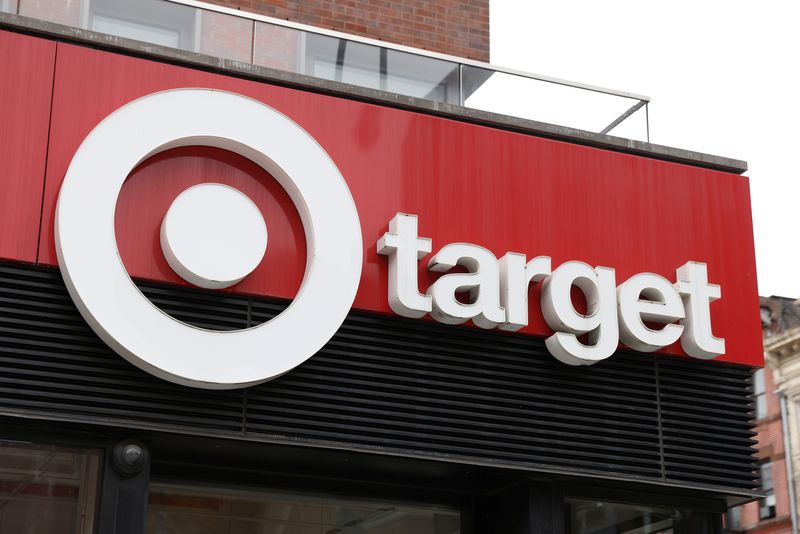By Siddharth Cavale
NEW YORK (Reuters) - Mass-merchandise retailer Target is expected to post a drop in holiday quarter same-store sales, its third consecutive quarterly drop, when it reports results on Tuesday.
But investors say the chain, which sells everything from $5 cami tops and $25 shorts to $100 coffee machines, may be able to boost sales and profits in 2024 as inflation moderates, giving shoppers more incentive to buy non-essential products.
The Minneapolis-based firm is expected to report a 4.6% drop in comparable sales for the holiday quarter and a 3.6% decline for the year, according to LSEG estimates.
Looking ahead, its 2024 sales are expected to rise by about 1%, according to LSEG. Commerce Department data on Wednesday showed that inflation is gradually cooling.
Facing competition from PDD Group's cross-border e-commerce site Temu, and Shein, a China-based direct-to-consumer retailer that has been gaining market share in the U.S., Target is taking steps to reach bargain-minded shoppers.
In January, Target introduced "dealworthy", a new line of 400 products, stretching from apparel and accessories to beauty, electronics and home products, at prices starting at $1.99.
The retailer, which operates nearly 2,000 stores, has also focused on stocking products that could incentivize shoppers to return for frequent purchases, such as beauty and food & beverage products, according to Jane Hali & Associates analysts.
"I'll be far more interested to see how or if consumer behavior is changing (than any specific sales or profit number)," said Charles Sizemore, chief investment officer of Sizemore Capital Management, which holds about half a million dollars in Target shares.
"After a two-year drought in discretionary spending -- and a noticeable slowdown in inflation -- spending on discretionary items should be in a good position for a rebound," Sizemore said. Target shares have been on an upswing, rising 38% since it reported its third-quarter results on Nov. 15.
In 2023, Target executives faced a right-wing backlash over its Pride merchandise and over inventory losses that Target said were caused by "organized retail crime." The chain had its first quarterly decline in store visits since before the pandemic during the second quarter of last year.
With freight rates dropping on routes from China to the West Coast and a stabilization in thefts at Target stores, analysts and investors expect Target executives to outline steps that may help it meet its EBIT margin target of 6% in 2024, up from 3.5% in 2022 and 6% in 2019.
What Target reveals about its longer-term EBIT margin potential will be "a key driver of the stock," Citi analyst Paul Lejuez said. Disruptions in the Red Sea have led to late arrivals of merchandise and rising container costs that could temper any margin improvement, Lejuez said.

Walmart (NYSE:WMT) reported a 39-basis-point jump in its margins, partly due to a 22% surge in ad sales on its retail media platform, thanks to spending from packaged food and consumer products companies pitching their brands to Walmart shoppers.
Analysts are also interested in whether Target saw similar benefits at its retail media arm, Roundel, which generated $1.17 billion in ad revenue in the year to October 2023, according to Insider Intelligence estimates. Walmart's U.S. retail media business, Walmart Connect, generated $3.17 billion.